Related Research Articles
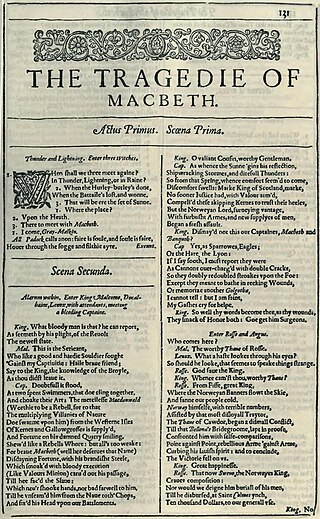
Macbeth is a tragedy by William Shakespeare. It is thought to have been first performed in 1606. It dramatises the damaging physical and psychological effects of political ambition on those who seek power. Of all the plays that Shakespeare wrote during the reign of James I, Macbeth most clearly reflects his relationship with King James, patron of Shakespeare's acting company. It was first published in the Folio of 1623, possibly from a prompt book, and is Shakespeare's shortest tragedy.

William Shakespeare was an English playwright, poet, and actor. He is widely regarded as the greatest writer in the English language and the world's pre-eminent dramatist. He is often called England's national poet and the "Bard of Avon". His extant works, including collaborations, consist of some 39 plays, 154 sonnets, three long narrative poems, and a few other verses, some of uncertain authorship. His plays have been translated into every major living language and are performed more often than those of any other playwright. Shakespeare remains arguably the most influential writer in the English language, and his works continue to be studied and reinterpreted.

Edmund Kean was a celebrated British Shakespearean stage actor, who performed, among other places, in London, Belfast, New York, Quebec, and Paris. He was known for his short stature, tumultuous personal life, and controversial divorce.
This article contains information about the literary events and publications of 1741.
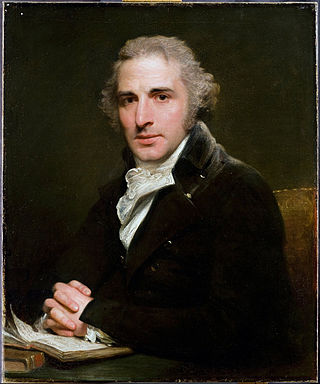
John Philip Kemble was a British actor. He was born into a theatrical family as the eldest son of Roger Kemble, actor-manager of a touring troupe. His elder sister Sarah Siddons achieved fame with him on the stage of the Theatre Royal, Drury Lane. His other siblings, Charles Kemble, Stephen Kemble, Ann Hatton, and Elizabeth Whitlock, also enjoyed success on the stage.
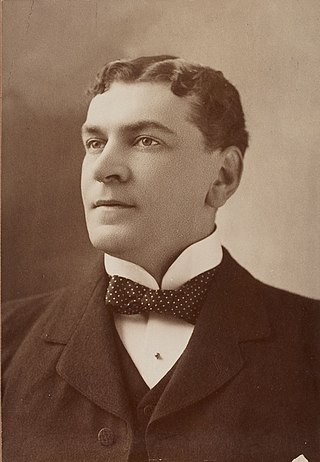
Arthur Bourchier was an English actor and theatre manager. He married and later divorced the actress Violet Vanbrugh.
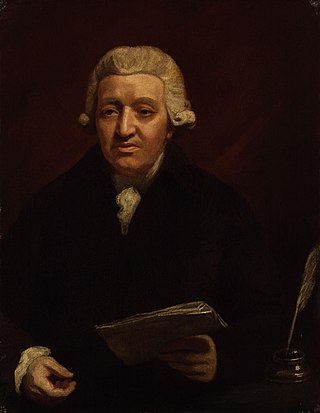
Charles Macklin, , was an Irish actor and dramatist who performed extensively at the Theatre Royal, Drury Lane. Macklin revolutionised theatre in the 18th century by introducing a "natural style" of acting. He is also famous for accidentally killing a man during a fight over a wig at the same theatre.

In his own time, William Shakespeare (1564–1616) was rated as merely one among many talented playwrights and poets, but since the late 17th century has been considered the supreme playwright and poet of the English language.

Samuel Phelps was an English actor and theatre manager. He is known for his productions of William Shakespeare's plays which were faithful to their original versions, after the derived works by Nahum Tate, Colley Cibber and David Garrick had dominated the stage for over a century.
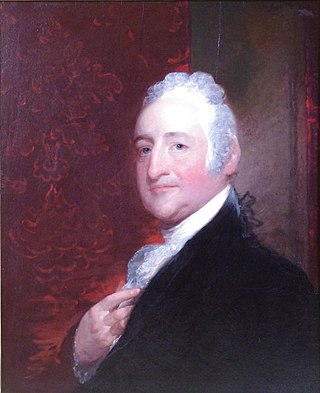
George Frederick Cooke was an English actor. As famous for his erratic habits as for his acting, he was largely responsible for initiating the romantic style in acting that was later made famous by Edmund Kean.
Robert Bensley was an 18th-century English actor, of whom Charles Lamb in the Essays of Elia speaks with special praise.

Shakespeare's plays are a canon of approximately 39 dramatic works written by the English poet, playwright, and actor William Shakespeare. The exact number of plays as well as their classifications as tragedy, history, comedy, or otherwise is a matter of scholarly debate. Shakespeare's plays are widely regarded as among the greatest in the English language and are continually performed around the world. The plays have been translated into every major living language.

The Tragical History Of King Richard Iii, Alter'd From Shakespeare (1699) is a history play written by Colley Cibber. It is based on William Shakespeare's Richard III, but reworked for Williamite audiences.
Events from the year 1741 in Great Britain.

Thousands of performances of William Shakespeare's plays have been staged since the end of the 16th century. While Shakespeare was alive, many of his greatest plays were performed by the Lord Chamberlain's Men and King's Men acting companies at the Globe and Blackfriars Theatres. Among the actors of these original performances were Richard Burbage, Richard Cowley, and William Kempe.

Theatre of United Kingdom plays an important part in British culture, and the countries that constitute the UK have had a vibrant tradition of theatre since the Renaissance with roots going back to the Roman occupation.

John Henderson (1747–1785) was an English actor who played many Shakespearean and other roles. He first acted in Bath, where he was known as "The Bath Roscius", and then in London. Had he not died young he would have been remembered as a worthy successor to David Garrick.
Dennis Delane was an Irish stage actor who appeared for many years at the leading London theatres.
Maria Macklin was a British actress. Her parents were both leading Irish born actors.
William Wybert Rousby was an English actor, in later years a theatre proprietor and actor in Jersey.
References
- 1 2 3 Lister, David (8 February 1997). "Sixty a day inspire more plays than Shakespeare". The Independent. Retrieved 20 January 2014.
- 1 2 3 4 Relich, Mario (19 September 2000). "John Cargill Thompson (obituary)". The Herald . Retrieved 20 January 2014.
- ↑ "The Actor's Apology". Dean Taylor Productions. Retrieved 20 January 2014.